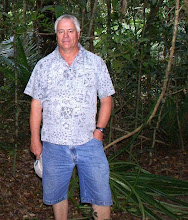
Brazil is the proverbial gorilla in the room when it comes to sugarcane production. According to
UNICA, during the 2009/2010 campaign that concluded on March 31, Brazilian mills had processed 542 million metric tons (or tonnes) of cane. Of the total cane processed, 42.6% was used for sugar and 57.4% for ethanol. Total sugar production was 28.6 million tonnes, while ethanol production was 23.7 billion liters. To put some of this into perspective, Brazil hauled more cane to their mills than the U.S. hauled corn (331 million tonnes), soybeans (73 million tonnes) and wheat (56 million tonnes), put together, based on crop statistics from
FAOSTAT. And these are our top three agronomic crops. Granted, the collective value of the unprocessed corn, soybeans, and wheat vastly exceeds that of raw cane, but still, the sheer weight and volume of cane being transported for processing in Brazil is truly impressive. The total cane production in the U.S. last year, combining FL, HI, LA, and TX, was 27.8 million tonnes, or approximately 1/20th the size of the Brazilian crop. The U.S. is ranked 9th, after Brazil, India, China, Thailand, Mexico, Pakistan, Australia, and Colombia. In terms of ethanol produced from sugarcane, Brazil is really the only significant player out there right now.

Brazil has decided to wage an education campaign, in part, to bring into question the basis for the
stiff tariffs the U.S. has imposed on ethanol exported from Brazil. If the U.S. is honestly trying to go green, and if the U.S. corn industry can't even begin to meet the potential ethanol demand, what is the point of the stiff tariffs? Brazil doesn't understand why the corn industry is pushing their congressional representatives to be so protective, when it isn't really necessary, and runs counter to our broader objective, as a country, to go green.
 Brazil is the proverbial gorilla in the room when it comes to sugarcane production. According to UNICA, during the 2009/2010 campaign that concluded on March 31, Brazilian mills had processed 542 million metric tons (or tonnes) of cane. Of the total cane processed, 42.6% was used for sugar and 57.4% for ethanol. Total sugar production was 28.6 million tonnes, while ethanol production was 23.7 billion liters. To put some of this into perspective, Brazil hauled more cane to their mills than the U.S. hauled corn (331 million tonnes), soybeans (73 million tonnes) and wheat (56 million tonnes), put together, based on crop statistics from FAOSTAT. And these are our top three agronomic crops. Granted, the collective value of the unprocessed corn, soybeans, and wheat vastly exceeds that of raw cane, but still, the sheer weight and volume of cane being transported for processing in Brazil is truly impressive. The total cane production in the U.S. last year, combining FL, HI, LA, and TX, was 27.8 million tonnes, or approximately 1/20th the size of the Brazilian crop. The U.S. is ranked 9th, after Brazil, India, China, Thailand, Mexico, Pakistan, Australia, and Colombia. In terms of ethanol produced from sugarcane, Brazil is really the only significant player out there right now.
Brazil is the proverbial gorilla in the room when it comes to sugarcane production. According to UNICA, during the 2009/2010 campaign that concluded on March 31, Brazilian mills had processed 542 million metric tons (or tonnes) of cane. Of the total cane processed, 42.6% was used for sugar and 57.4% for ethanol. Total sugar production was 28.6 million tonnes, while ethanol production was 23.7 billion liters. To put some of this into perspective, Brazil hauled more cane to their mills than the U.S. hauled corn (331 million tonnes), soybeans (73 million tonnes) and wheat (56 million tonnes), put together, based on crop statistics from FAOSTAT. And these are our top three agronomic crops. Granted, the collective value of the unprocessed corn, soybeans, and wheat vastly exceeds that of raw cane, but still, the sheer weight and volume of cane being transported for processing in Brazil is truly impressive. The total cane production in the U.S. last year, combining FL, HI, LA, and TX, was 27.8 million tonnes, or approximately 1/20th the size of the Brazilian crop. The U.S. is ranked 9th, after Brazil, India, China, Thailand, Mexico, Pakistan, Australia, and Colombia. In terms of ethanol produced from sugarcane, Brazil is really the only significant player out there right now. Brazil has decided to wage an education campaign, in part, to bring into question the basis for the stiff tariffs the U.S. has imposed on ethanol exported from Brazil. If the U.S. is honestly trying to go green, and if the U.S. corn industry can't even begin to meet the potential ethanol demand, what is the point of the stiff tariffs? Brazil doesn't understand why the corn industry is pushing their congressional representatives to be so protective, when it isn't really necessary, and runs counter to our broader objective, as a country, to go green.
Brazil has decided to wage an education campaign, in part, to bring into question the basis for the stiff tariffs the U.S. has imposed on ethanol exported from Brazil. If the U.S. is honestly trying to go green, and if the U.S. corn industry can't even begin to meet the potential ethanol demand, what is the point of the stiff tariffs? Brazil doesn't understand why the corn industry is pushing their congressional representatives to be so protective, when it isn't really necessary, and runs counter to our broader objective, as a country, to go green.




